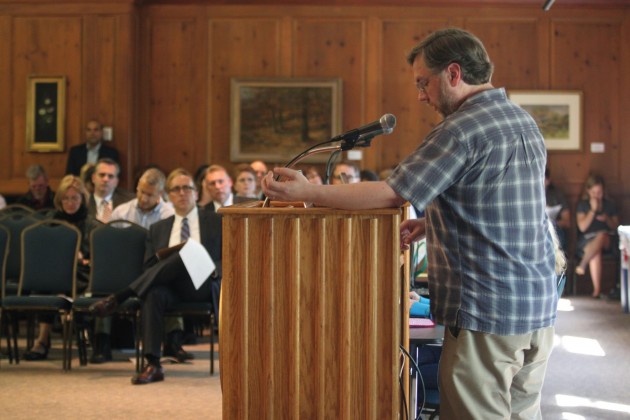
DePauw's faculty received an update on the institution's financial state Monday night at the first all-faculty meeting of the year.
In the update, Brad Kelsheimer, vice president of finance and administration, focused on DePauw's financial health and resource management.
The university's financial health is determined by two factors. The first is acute management, which is paying bills on time and staying within budget.
DePauw's acute management is not in perfect shape, but the debt is decreasing and bills are being paid. "We are still getting a deficit [in the budget]," Kelsheimer said, "but we are also still paying the price of the market drop in 2009."
The second factor is an external assessment. DePauw uses Moody's Investor Service, a company that provides customers with a financial analysis that can be compared with those of competitors. 1,500 universities are ranked by Moody's system, which gives DePauw a large pool for comparison.
DePauw rates in the center of the continuum. The ranking could be better if not for the large gap between tuition and cost of educating each student. Net tuition per student is over $16,188 while the educational expense per student is over $36,530. In order to bridge the gap, the university made cuts to the facilities management budget, which lowers DePauw's Moody rating as well. Still, DePauw does have sufficient funds to cover its operating cost.
The available funds go to three major budgets - operating, annual capital and major projects. The operating budget covers DePauw's academic mission, opportunities to reduce overhead and investment funds. The annual capital budget covers the renewal and replacement budgets, which are for projects such as sidewalk repairs. The major projects budget covers large jobs such as the current construction on Anderson Street. The funding for these projects comes primarily from donors and grants like the Indiana state sponsored Stellar Communities grant.
DePauw's resources are scarce, but the administration is happy with how DePauw's resources are being managed overall. The university's main goal is preserving the "academic mission," and so far the university has not had to make any cuts to that budget.
President Casey said the financial problems originated in the '90s when the administration expanded the faculty and built new facilities. Casey indicated that the expansions allowed DePauw to grow and become a better university over all.
"It's the same thing I would have done," Casey said.
The administration at the time, however, did not look at the sustainability of its projects as closely as it should have. Now the effects of those projects are being dealt with.
"We're taking a long-term approach," Kelsheimer said. "The problem didn't happen overnight, so we can't fix it overnight. The important thing is to be resilient."
- Ellen Kobe contributed to this article.


